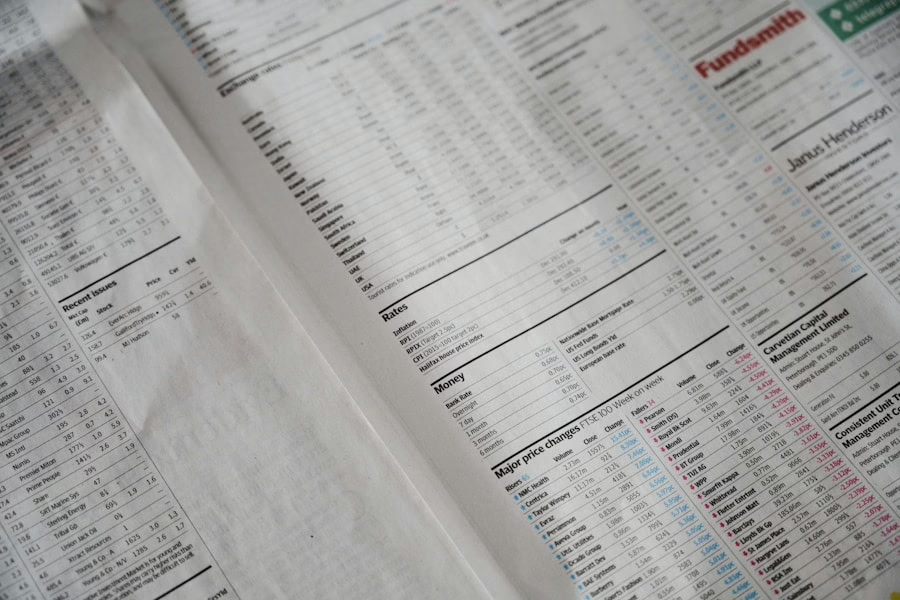One of the most common budgeting mistakes people make is not tracking their expenses. Without a clear understanding of where your money is going, it’s nearly impossible to create an effective budget. Tracking expenses allows you to identify areas where you may be overspending and make necessary adjustments.
For example, you might realize that you’re spending more on dining out than you thought, and this awareness can prompt you to cut back on restaurant meals and allocate those funds to savings or debt repayment instead. There are numerous tools and apps available that can help make expense tracking easier, such as Mint, YNAB, or even simple spreadsheets. Another consequence of not tracking expenses is the potential for financial surprises.
Without a clear picture of your spending habits, you may find yourself facing unexpected bills or struggling to make ends meet at the end of the month. By diligently tracking your expenses, you can anticipate and plan for these costs, ultimately leading to a more stable financial future.
Underestimating or Ignoring Debt
Underestimating or ignoring debt is another common budgeting mistake that can have serious long-term consequences. Many people make the mistake of only making minimum payments on their debts, which can lead to paying significantly more in interest over time. Additionally, ignoring debt can lead to a false sense of financial security, as the debt continues to accumulate interest and hinder your ability to save and invest for the future.
To avoid this mistake, it’s crucial to take a proactive approach to managing and paying off debt. This may involve creating a debt repayment plan, prioritizing high-interest debts, and seeking opportunities to refinance or consolidate loans to lower interest rates. By acknowledging and addressing your debt head-on, you can free up more of your income for saving and investing, ultimately setting yourself up for a smarter financial future.
Failing to Plan for Unexpected Expenses
Failing to plan for unexpected expenses is a budgeting mistake that can derail even the most carefully crafted financial plans. Life is full of surprises, and without a buffer for unexpected costs, such as car repairs, medical bills, or home maintenance, these expenses can quickly lead to financial strain or debt accumulation. To mitigate this risk, it’s essential to incorporate an emergency fund into your budget.
Financial experts often recommend setting aside three to six months’ worth of living expenses in an easily accessible account to cover unexpected costs. By planning for the unexpected, you can avoid the need to rely on credit cards or loans when unforeseen expenses arise, ultimately safeguarding your financial stability.
Overestimating Income
Overestimating income is a budgeting mistake that can lead to overspending and financial hardship. It’s easy to fall into the trap of counting on bonuses, raises, or other uncertain sources of income when creating a budget. However, relying on unpredictable income streams can lead to budget shortfalls and an inability to meet financial obligations.
To avoid this mistake, it’s important to base your budget on your guaranteed income rather than potential windfalls. This approach ensures that your budget remains realistic and sustainable, even in the absence of additional income sources. If extra income does materialize, it can then be allocated towards savings or debt repayment, rather than being relied upon for day-to-day expenses.
Neglecting to Save for the Future
Neglecting to save for the future is a critical budgeting mistake that can have far-reaching implications. Whether it’s for retirement, education, or major purchases, failing to prioritize savings can leave you vulnerable to financial insecurity down the road. Without adequate savings, you may be forced to rely on credit or loans to cover future expenses, leading to increased debt and financial stress.
To avoid this mistake, it’s important to make saving a non-negotiable part of your budget. This may involve setting specific savings goals and automating contributions to retirement accounts or other savings vehicles. By consistently prioritizing savings in your budget, you can build a financial safety net and work towards achieving long-term financial goals.
Overspending on Non-Essential Items
Overspending on non-essential items is a common budgeting mistake that can hinder your ability to achieve financial stability and reach your long-term goals. While it’s important to enjoy life and treat yourself occasionally, excessive spending on non-essential items can quickly erode your financial resources and impede your progress towards more meaningful objectives. To avoid this mistake, it’s helpful to differentiate between needs and wants when creating your budget.
By prioritizing essential expenses such as housing, utilities, groceries, and debt repayment, you can ensure that your basic needs are met before allocating funds towards discretionary spending. Additionally, setting aside a specific portion of your budget for discretionary expenses can help prevent overspending while still allowing for occasional indulgences.
Not Revisiting and Adjusting the Budget Regularly
Not revisiting and adjusting the budget regularly is a common oversight that can undermine its effectiveness over time. A budget is not a static document; it should evolve with changes in income, expenses, and financial goals. Failing to review and adjust your budget regularly can result in missed opportunities for optimization and may lead to financial inefficiencies.
To avoid this mistake, it’s important to schedule regular check-ins with your budget – whether monthly, quarterly, or annually – to assess its performance and make necessary adjustments. This may involve reevaluating spending habits, reassessing financial goals, and accommodating changes in income or expenses. By actively engaging with your budget on an ongoing basis, you can ensure that it remains aligned with your current financial circumstances and aspirations.
In conclusion, avoiding these common budgeting mistakes is essential for building a solid foundation for a smarter financial future. By tracking expenses, addressing debt proactively, planning for unexpected costs, basing budgets on realistic income projections, prioritizing savings, managing discretionary spending wisely, and regularly reviewing and adjusting budgets, individuals can enhance their financial well-being and work towards achieving their long-term financial goals.




